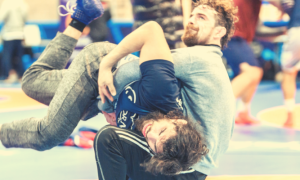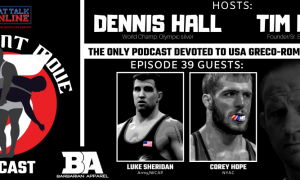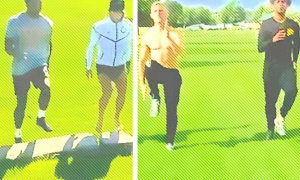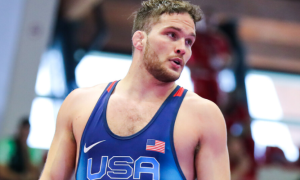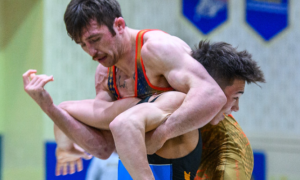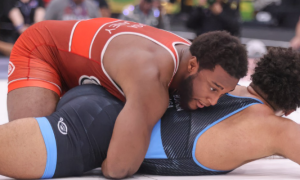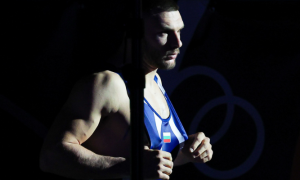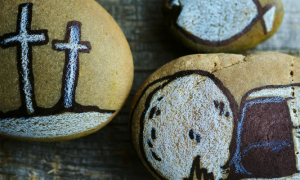There is an almost compassionate obsessiveness in the manner Corey Hope (77 kg, NYAC) answers questions.
When Hope speaks, he feels as though he has to make it count, lest something get missed. There is a focus on detailed introspection. He is willing to reveal his innermost feelings in much the same way a coach or mentor figure might, particularly if he/she is trying to help you understand something about meaningful about them. That way, when the periods finally arrive at the end of sentences and you exit the conversation, you’re confident in the information that has been handed down. It all comes from a place that is intended to provide an applicable brand of value. Hope wants you to receive the full scope of his worth simply because you asked for his time, and therefore, you deserve it. And when it’s all over with, he stops short and pauses to ensure your absorption. He’s got a real ‘Okay, so now you know’ kind of style.
What makes Hope’s method of communication all the more unique is that you won’t find a shred of self-importance. Similar to his twin brother Ryan who has since moved on from Senior competition, his love for Greco-Roman is so grand and his knowledge so all-encompassing that he elevates it above his himself. Hope seems to believe that the sport is akin to the ocean. You can swim or surf or float among the waves, and maybe even hold your own or better. But the ocean’s very nature is to provide an element of danger that never ever disappears, you are constantly at its mercy. And as with anything else in existence that holds the capability to be merciless, unerring respect is required for mere participation.
The ocean doesn’t care if Kelly Slater is in the water, and Greco-Roman doesn’t care if Corey Hope is on the mat. Both environments are equally unforgiving. Which is precisely where the beauty resides. You are never bigger than the activity you love the most, especially if that activity has the power to smash your body and mind into pieces.
Hope’s body has not been smashed to pieces, but it’s close. A series of injuries dating back three years have blockaded his passage towards the top. You would need a calculator, a wall chart, and a PowerPoint presentation to run through all of the nicks and tweaks that Hope practices with daily, and will likely remain in the picture long after he ceases lacing up his shoes for competition. These injuries are not the result of a brittle physical makeup. They are the byproduct of a man in love with what he does and who is okay with paying the price despite the agony.
Actually, no, scratch that. He’s perfectly fine with the agony, too.
At the moment, progression halted due to injury represents the lens from which Hope’s career is most often viewed. He and Ryan both shot out of Northern Michigan with promising futures, and both gradually turned themselves into contending names in their respective weight classes. 2016 is when Corey really seemed to be on the cusp of a serious run. First, he won the Dave Schultz Memorial; then at the Olympic Trials two months and some change later, he came close to securing a spot on the US National Team. The wheels screeched off the rails shortly after, and during that most recent forced hiatus, a new generation of athletes had begun to emerge.
It wasn’t until the early winter of 2017 when Hope finally became hole again. Temporarily. He jetted over to Russia and nabbed a silver right out of the gate. A week later, it was a bronze in Finland. Next thing you knew, he was back on the shelf. No US Nationals, no World Team Trials. Instead, it was more rehab, more healing, more waiting. More frustration. One of the United States’ most knowledgeable and ardent workers just could not stay healthy.
The past few months have been kinder. Relatively speaking. Hope’s moving parts are moving the way they’re supposed to. He is stronger than at any other point previously, an important note to bring up due to his pasting physical style. However, if you want to stretch the boundaries a little, climb inside of the inner neuroplasticity workings of one Mr. Hope, then you will come to realize that it’s his mind that is the strongest asset of all.
Sense does it make? Maybe. The majority of wrestling clichés and idioms endlessly passed down from one generation to the next are mostly true. Wrestlers tend to soak up adversity better than common folk. Or non-wrestlers, whichever, whatever. Where Hope slightly veers off the path is in his own analysis of what has transpired to usher him to the present. He objectifies as best he can the peaks and valleys, and eases his own burden of thought by choosing the most logical available option: outwork everyone. That, make no mistake, is the only way he can find relief and rediscover his purpose. Over and over and over again.
The calendar now beckons. Hope is set to compete at the US Nationals in Las Vegas beginning on April 25th. The moment he takes the mat will mark the first time in over three years he has done so on American turf. The in-between stuff won’t be forgotten, it just won’t matter anymore, not in the same way. He’s got free reign. There are no restrictions. Operating unencumbered, as they say. Of course, he will also not be waltzing into the South Point carrying the same kind of star power as some of the others. For most, he is currently seen as a sleeper. Unimportant. It’s only Step 1. Following a journey that has claimed far too many careers to quantify, Corey Hope knows what he had to endure in order to return. At this stage, he’s just pleased to jump back in the water.
5PM Interview with Corey Hope
5PM: As we sit here today a couple of weeks out from the tournament, how do you feel physically if you had to put a percentage on it?
Corey Hope: Mentally what I tell myself is different than what it shows on the chart. I wouldn’t say it’s 100%, but it’s somewhere between 75 and 85%.
5PM: It has been almost a year-and-a-half since you last competed, which was December of 2017 when you won back-to-back medals overseas. With that amount of time missed, and you have been through this a couple of times in your career, but with this latest interruption, do you feel frustration? Do you feel regretful or agitated? Or do you keep some sort of positive mental outlook?
CH: It definitely sucks. People always talk about how it sucks to sit on the sidelines, but if you’re not on a (World or Olympic) Team, you’re sitting on the sidelines anyway. So, yeah. It sucks to sit out of practices, it sucks not being able to compete or go to all of these places that you want to go to. You feel as though you’re body is betraying you and that people are losing faith in you. But I try as much as I can to not let that stuff bother me. That’s negative self-talk. Those are negative self-assumptions that you make. You just have to push that shit out of your way, man. Part the sea of that negative shit and row your boat in the positive waters.
That’s kind of where I try to live mentally. It’s one of those things where, Everyone is doing this and making Teams, competing, going to camps, and I have to do my own thing. Because, at the end of the day, who is it you have to worry about? That’s yourself. Your worst enemy is between your ears. So I don’t think about that stuff. I don’t dwell negatively, I am not like, Oh no, I wish I was at this tournament…, and blah, blah, blah. It’s not, Oh, this sucks, I’m frustrated this is happening to me, and awww, I can’t do it. No, fuck that. I have a whole lot of other things to be positive about, I have a whole lot of other things on my plate to focus on. That is where I try to place my focus and where I try to place my mentality.
5PM: You’re a student of the sport. Both you and your brother are practically historians when it comes to Greco. When you look at the way the style is competed at the moment, and it might be erratic depending on the weight class although scoring is up a little bit, there is an inherent perception that guys still don’t like to take risks. What do you see as the positives and negatives regarding Greco’s current landscape?
CH: Well, I would view something like the referees having too much control as a negative. I mean, a lot of us have always talked about it, joked about it, and we all have our opinions about what we think would be best. A few of us even had a discussion about this after practice the other day, and I chalk it up to the same example that I always use, which is the 2013 World Team Trials in Oklahoma. Freestyle that year got to try out overtime. Jordan Burroughs and Kyle Dake went into overtime and the entire arena went nuts. When the points got scored, they went nuts; and when Jordan Burroughs took Kyle Dake down, I’d say that was within less than :30. He just went after it, got his takedown, and made the team. The crowd just erupted.
In virtually every other major sport there isn’t a tie, they go to overtime. Hockey might go to a tie score prior to the playoffs, and maybe there are other sports out there that go to a tie. But for the most part, everyone understands what happens in an overtime. And when that game or match, or whatever it is, is over, everyone knows who the winner is. It’s not some cryptic thing you have to fucking decode to get there. You’re trying to bring people into the sport of wrestling, especially at this level, and it is This guy won, but the other guy did this and that, but the score is still tied? So the response is, Here, let me count down for you the criteria for winning. If you went into an overtime, the criteria for winning would just dissolve itself.
We had a discussion today after the matches. TC Dantzler mentioned that if the referee is constantly hitting the guy you’re wrestling with passivity — and the ref has his hand raised and is about to call a passive and you’re both near the edge — don’t push the guy out (of bounds). Why? Because that passive-and-one call is going to be worth more criteria-wise than that one point you’d get for a step-out. That’s a real shitty thing for guys in the sport to even have to think of. Plus, you know that there are people in the crowd who have no idea what’s going on. People like to say that wrestling is like a physical game of chess, but you shouldn’t have to sit there with a rulebook to understand it. I’m sure that most of these guys around the country have to inform their parents about the rules before every tournament, and, just like my dad, there is probably a father out there who is like, I don’t understand this! The refs have too much control! I get it. In my opinion, anything that is left in the refs’ hands is stupid.
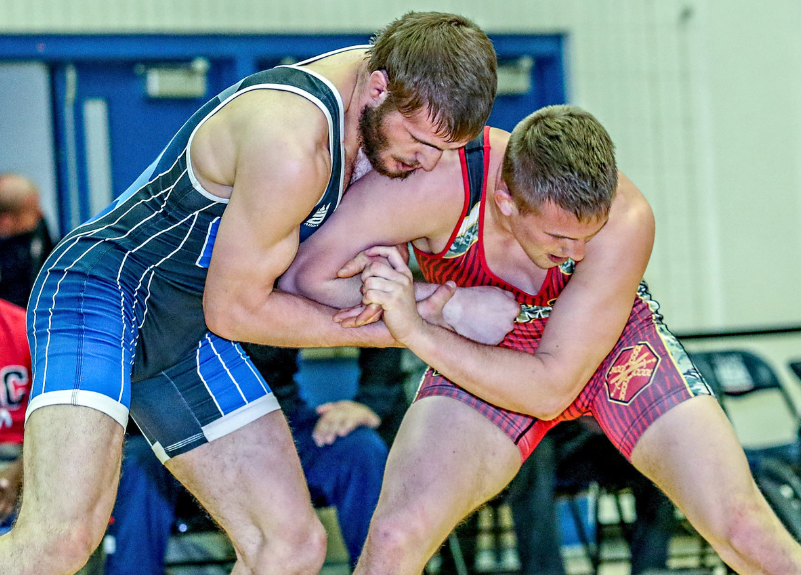
Hope (blue) defeated Dillon Cowan in the 75-kilogram final of the 2016 Dave Schultz Memorial. (Photo: John Sachs)
I think we should go back to how matches were in the late-90’s and early-2000’s when you would be put down in passivity and there were no points given. The referee would just take an athlete and put him down in par terre. Then he would bring them up and they’d go back to wrestling on the feet. We could keep the period format the same and the scoring format the same. But nowadays, referees are afraid. Let’s say there are two good guys wrestling and they are evenly-matched, and one guy is going balls to the wall and making the other guy look passive. Typically what happens is that the more aggressive guy is going to get the call first. And then in the second period, and since you’re only allowed to have two passivities, they have a tendency to put the guy who is still being more active down in par terre. In very rare cases they will put the same guy back down. But referees are afraid because they think it will look they are choosing who wins the match. Especially if you are the guy who comes out there and is active the whole match, you are typically the guy who is going to get the passivity call first and now you’re ahead. But all that means is — just going by statistics — that you’re still going to lose that match because they are going to hit you with the second period passivity, which is the last point scored, so you will lose due to criteria.
Back in the day, you could get put down five, six, seven times in a match — and there was some abuse to that, some guys got put down a lot even if they weren’t being passive — but at the end of the day, you’ve got to defend. If you don’t have good par terre defense or offense, you are probably not setting yourself up for Olympic or World gold. Get good on your feet, defend on fucking bottom, and get the work done. If that guy can’t score on you from top, it’s his own fault, too. That’s where I sit on the rules. Anything that puts it in the refs’ hands is detrimental and confuses fans.
As far as styles go, what I do like about the sport is that we are hitting guys with passivity. I’m not talking about passives and one’s here, I’m talking about passivity in general. We’re on our feet longer, it’s not the one-and-a-half minutes and another half that we did a decade and change ago. Now there are more opportunities for guys to score on their feet and they are really trying to make an attempt to get guys away from being on the fingers. They are also punishing guys for fleeing the hold. Like you said, there is an increase in scoring going on. I still think that the sport has evolved so much from the 80’s, 90’s, and early-2000’s that a lot of Greco guys don’t stand in a square stance. They’re hunched over and leading with their heads first instead of with their hips and torsos, but it’s kind of the style and it’s their choice, too. You’ve got guys who do that and they are putting medals on the board. It comes full circle. Every style is different, and I think that is kind of the beauty of it, too. You have guys who are counter-wrestlers and scramblers, like a Ben Askren. You’ve got guys who are just hard-nosed and are going to be on you offensively all the time. You see it a lot.
I think we are headed in a better direction in terms of rule changes, attempts to score, and taking that risk than we were in the past decade. So who knows? We’ll see where we end up as a style. I don’t know, I just wrestle (laughs). I just go out there and do my shit. That’s what I do. I’m just a wrestler. I’m not the guy who makes big decisions over at UWW (United World Wrestling) or anything.
5PM: You said you wouldn’t change the point values or the periods, but what if it could go back to one five-minute period instead of two three’s? Would you be in favor of that?
Corey Hope: Oh, yeah. I’m a proponent of having a big gas tank but I think having a big gas tank comes down to just a handful of factors outside of just, Are you prepared? It also comes down to your mental state. Confidence is one thing. I don’t know how many people know that confidence is an attribute of a big gas tank, but it is. Because, most people just think, Oh, you’ve just got to be mentally tough, have that mental fortitude and be willing to push past the pain. Well, yeah but no, it really just comes down to confidence. If you’re confident that you can go balls to the wall and keep doing it throughout the course of a match, your brain will not go into panic. If your brain doesn’t go into panic mode, then your heart rate stays low and you can concentrate on wrestling instead of on how fucking tired you are. I would love the one five-minute period. I’m a goer. I enjoy the grind, I enjoy the struggle. I’d love the one five-minute period.
5PM: Back to you on the mat. When you got cleared to return to practice and all that, were you able to resume training as if you didn’t miss a beat? Or was there an assimilation period you needed to get comfortable again?
CH: There was an interval when I felt I was able to get right after it. But still, even after this first week of Pan Ams camp where you get all these fresh guys in the room, you start to notice, Ah, this is a little off, that’s a little off; less risk-taking here, this is happening there. So I think it’s a little bit of both. It’s not like I got kicked by a horse or anything and I won’t get near one again, for a comparison. Yeah, something chaotic and shitty happened but you get right back to the anvil and keep hammering away. I’m not saying it’s what you do but it’s what I do, at least.
I don’t sit back. I don’t like people feeling bad for me. Don’t do that. I’m going to be fine. I’m an adult. This is a sport that I love and have chosen to do, but this sport is also a cruel mistress. It can pull the rug from right underneath you and turn your whole world into chaos. This is my choice. This is something that I chose to do and chose to love.
Take football. Without getting too political or anything, but it’s ‘concussion this’ and ‘concussion that’. It’s not like concussions are non-existent in hockey and rugby, but you’ve got football players complaining about concussions. Big helmets, little helmets, or no helmets at all, concussions are there. But football players say, My life’s different now, I’m stupid, my brain doesn’t work and I’m in a bad mood. And it’s like, Well, yeah, because you’re a whiny little bitch, it’s not because of concussions. You’re fucking soft. This is the wussification of America. Get over yourself.
This is the sport you chose to do. If you didn’t want a concussion, you should have tried to become a CPA or something. Not that I have anything against CPA’s. But go, be a teacher or a something else with no contact. You should know full well that if you’re running at some dude at full speed, and he’s running at you at full speed, and you’re trying to tackle him to get the ball, what did you think was going to happen? Shit, in the sport of wrestling you get tossed, you get your fingers broken, knees torn, and whatever else that goes on. Feel sorry for me? No, I do everything in my power not to skip a beat on whatever my path is for that day, week, or month. Ohhh, hey, it looks like you’re doing rehab for X number of months. Okay, so then it’s, Well then I better do everything as qualitatively hard as a I can for six months and hit it hard. That’s my task at hand. My task at hand is not wrestling live, my task is to do everything right so that I can wrestle live later.
5PM: By the time the Open comes, it will have been over three years since you last competed in America. That was the Olympic Trials at Carver Hawkeye Arena. Other than that trip in late 2017 you have been off the radar almost completely. A lot of people know who you are but you haven’t been around. Those actually in the sport are obviously aware and know you well. The casuals and mainstream audience, they’re not as familiar. Do you also see it that way, that you are being overlooked by the fanbase entering this Team-making part of the season?
CH: Yes. I would agree with that statement. I wouldn’t doubt it if most people thought I retired or had fallen off the face of the Earth. I do think I’m overlooked. I was overlooked at a lot of tournaments, those bigger tournaments that have rankings and maybe I came in fifth or fourth. So yeah, I’m overlooked, but you know, whatever. I guess you just go out there and do what you do, overlooked or not.
5PM: Is that in any way advantageous?
CH: Hmmm, to an extent. Look at it this way: let’s compare Robby Smith after his first Worlds in 2013. It was, Oh, he’s a one-trick pony…blah, blah, blah…all he’s got is a front headlock…blah, blah, blah. That’s all he’s got. And then it’s like, Um, no, he’s got a whole lot more shit than that but you know damn well that those guys in his weight class know next year that he has a front headlock. But you could take a guy who in that first year has a breakout performance because he’s unknown. You’re just a dark horse, you’re under the radar just doing your deal, doing your thing.
Obviously there is something to be said for being able to compete throughout an entire quad and there are different challenges that come with not being able to compete the whole time. And — there are also challenges that come with being able to compete throughout the whole quad. Yeah, I do think there is an advantage — and with those advantages come disadvantages. But you have to take what God has given you and run with it. Take everything that you’ve got and turn it into an advantage, even if other people don’t see it the same way. Make it an advantage for you, whatever it is. Whether it is being unknown or overlooked, or even if it’s just something dumb. Like maybe you read more, maybe that’s an advantage. Whatever you think gives you an advantage, use it to motivate yourself.
5PM: What do you find to be the most rewarding component about participating in this sport, even after all these years?
Corey Hope: I can think of many. I mean, it’s the opportunity, the journey, the experience. I have always been intrigued by things you can use as a tool for finding out what you’re really made of. To me, that is probably one of the most important things. As I mentioned earlier, I enjoy the challenge. I enjoy the struggle. Maybe I’m a little bit of a masochist but the pain that comes with this sport is rewarding. I enjoy finding those resources that mold and shape who you are, and just tell you who you are and what you’re made of. That’s a big payout from this sport.
The opportunities, the camaraderie, and the experiences that you gain on the mat, off the mat, traveling domestically as well as internationally — those are all big benefits of this sport. There is also the maturity that comes with all of these things. Wrestling enacts growth. These are components that I think are crucial — growth, finding out what you’re made of, and finding out who you are. Those are things I don’t think other sports can quite give you.
I don’t know if I’ve told you this, but I think wrestling is the greatest sport in the world. Obviously I am biased because I’m a wrestler, but most sports have some sort of physical requirement that you can’t control. Basketball, you have to be tall; volleyball, you have to be tall; football, you have to be big. With track, you have to jump really far or run really fast. All that stuff. Wrestling? Wrestling is, I don’t give a fuck what you’ve got, just bring something to the table. I don’t care if you’re short, tall, skinny, or fat. I don’t give a shit. It’s all about what’s between your ears and what’s beating in your chest. That’s why wrestling is the greatest sport, it’s what you bring to the table and how well you can impose that as an individual.
Follow Corey Hope on Instagram to keep up with his career and competitive schedule.
SUBSCRIBE TO THE FIVE POINT MOVE PODCAST
iTunes | Stitcher | Spreaker | Google Play Music | RSS

Notice: Trying to get property 'term_id' of non-object in /home/fivepointwp/webapps/fivepointwp/wp-content/themes/flex-mag/functions.php on line 999




